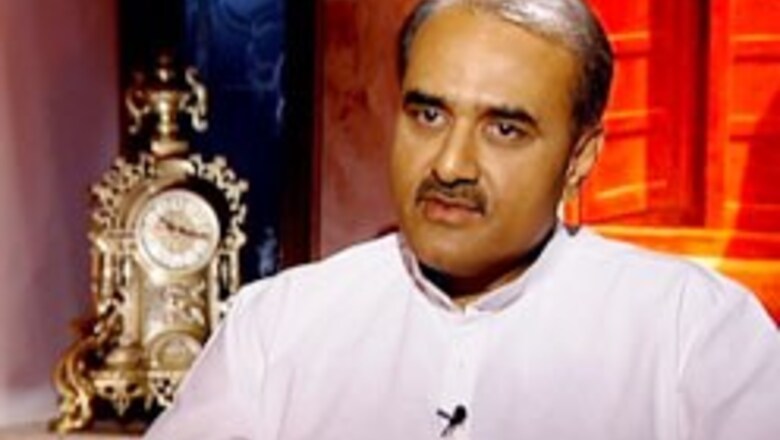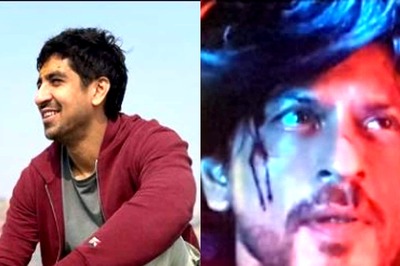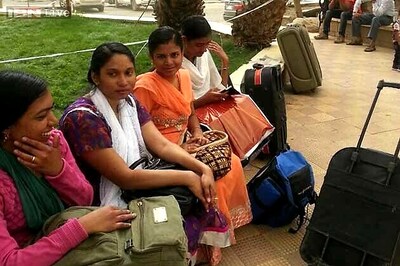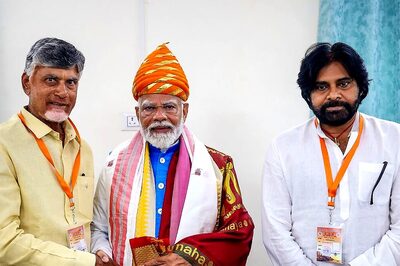
views
The airline industry is one of the fastest growing sectors of the Indian economy. But does the government’s new proposed aviation policy tackle the challenges it faces? And beyond that, what's future for the two government airlines -- Air-India and Indian Airlines? Those are the issues Civil Aviation Minister Praful Patel addresses in an exclusive interview with Karan Thapar on Devil’s Advocate.
Karan Thapar: Minister, let’s start with the new civil aviation policy that your ministry’s working upon. With airlines traffic projected to grow at about 20 per cent a year for the next five years, there is no doubt that you need a new policy. But what are the principles that it is based upon?
Praful Patel: About two years ago, we started on this new journey, I would say, in civil aviation to take it on the fast track to reflect the new changes which are required in our context. We had a report of the Naresh Chandra Committee, which was formed by the previous government.
He gave a good roadmap of what civil aviation should be in future. But down the line somewhere I felt that it would not reflect the pace at which we are now proposing the reforms. SO, there was a little delay. And that delay will be good in the long run, because it will reflect a policy which will be taking or catapulting civil aviation to a new high.
It has never been considered as a major investment sector or not being considered as very important for the growth of the economy. It's just been a concept of the elitist people travelling from point A to point B.
Karan Thapar: So, you are telling me that this is a well-considered and a thoroughly analysed policy that you are going to come up with?
Praful Patel: Of course, you must. Now whatever you do, you must spell out a roadmap for the next 10-20 years at least. Unfortunately in our country, in most of our planning, we have never really factored what's good for India in the next 50 or 100 years.
Karan Thapar: If this a policy for the next 50 years or 100 years, then let’s tackle some of the key issues that it should raise? One of the key issues is, are you giving permission to foreign airlines to invest equity -- perhaps a minority capacities -- in Indian Airlines.
PAGE_BREAK
Praful Patel: No, I tell you the reason why we have not taken a decision on that yet. It's because we have to evolve. Indian carriers must first attain critical size and mass. They must be in a position to grow fast. Otherwise they will just be gobbled up. We will end up here. And believe me, every country including the United States.
Karan Thapar: What about Sri Lanka, a small island, which has given Emirates permission to acquire 49 per cent in its national carrier. If Sri Lanka can do it, why can’t you? You are about 20 times their size?
Praful Patel: No, we cannot compare Indian aviation with Sri Lanka. We will have to compare Indian aviation with what is happening in Europe or in the United States.
Karan Thapar: The Naresh Chandra Committee, the NK Singh Group, all recommended equity up to 49 per cent for foreign airlines in Indian airlines. Why are you overlooking the recommendations?
Praful Patel: I think there is a little contradiction on what is being spoken of in this context. The real issue here is we are not saying that government’s policy shall be sacrosanct in terms of casting stones. It will never happen. We are saying that we want Indian carriers to evolve over a period of time. If you look at Air-India, Indian Airlines, Jet Airways and now Kingfisher, all these airlines are bringing in a level of surface which is comparable to any good carrier in the world. So what is the problem?
Karan Thapar: Well, that will be debatable. But why are you treating airlines as if they are different to insurance companies or telecom companies? Foreign telecom companies and foreign insurance companies can invest in Indian telecom and insurance ventures. Why can't foreign airlines invest in Indian Airlines?
Praful Patel: That is exactly the point I am making. We need our carrier to evolve. I am not trying to say that it will never happen or it will never be allowed.
Karan Thapar: How much down the road will you permit this to happen? Ten years, 15 years?
Praful Patel: I am not saying 10 years, it's too long a time. I think it will happen in the next five years.
Karan Thapar: In the next five years, you will permit foreign equity participation in the airlines?
Praful Patel: You will see a change coming about. Yes, airlines including airlines of other countries will be allowed to participate.
PAGE_BREAK
Karan Thapar: Could five years become sooner?
Praful Patel: No, I don’t think so for simple reason that Indian carriers are too small. Do you know the number of aircraft there are in India? Just about 210 commercial aircraft fly in India.
Karan Thapar: But Sri Lanka, the example I keep raising, has even fewer aircraft. Why do they not have inhibitions?
Praful Patel: I don’t want to say that anything is wrong in what the Sri Lankan government decides. But I do not think that what is good for Sri Lanka is good for India.
My point is very clear. Do you know that in India we have only 210 aircraft spread among all the airlines operating in India, including the international carrier like Air-India? Take the example of the United States or Europe. In the US, there are 7,500 aircraft, each carrier has got about 500-700 aircraft.
Karan Thapar: At what level of critical mass, which you hope to achieve in five years, do you think it will be possible and desirable for foreign airlines to take up equity stakes in India?
Praful Patel: I think Indian carriers will definitely scale up to about 1,000 in the next five to seven years. And that is the time, when I think, they would have achieved the critical mass, which would be healthy for them to invite anybody to participate, especially carriers.
Karan Thapar: All right. Let's look at a second big issue: the whole process of airport modernisation. On April 4, you signed a shareholders' agreement in what is called the OMDA for Delhi and Mumbai airports. When do you propose to actually and physically hand over the airports to the new joint venture companies?
Praful Patel: Well along with the OMDA, the shareholders' agreement was signed. The companies have been formed, the equity shares have been issued and they have given their guarantees. And we are targeting April 30 as the cutoff date for handing over the airports.
Karan Thapar: In other words, You will be handing over the airports in just over a week's time?
Praful Patel: Yes, in about 10 days, or 15 days maximum, factoring a few days here and there.
Karan Thapar: So, if it doesn't happen by April 30, it will definitely happen before the convening of the parliamentary session of May 10?
Praful Patel: Yes, it has nothing to do with the session of Parliament, but it will happen.
PAGE_BREAK
Karan Thapar: That's a guarantee?
Praful Patel: Yes, I have given dates. We are finalising things, I have put my neck on the block.
Karan Thapar: You are putting your neck on the block because the problem is that the Left parties and the unions are demanding that you do not hand over the airports physically to the private sector companies until after the tripartite committee's report is finalised as on May 22. Why are you defying them?
Praful Patel: I have spoken to them. I have met the unions. I went and addressed the unions in their own backyard. I made it very clear that the airports shall be handed over. There is no confrontation. I have spoken to the unions myself.
Karan Thapar: There is a confrontation. Let me point out to you. Prakash Karat in a letter to the Prime Minister has said that if you hand over the airports before the tripartite committee has finalised its report, you will be breaching the CMP. And the union, CITU, has officially said to you that they will go on a strike.
Praful Patel: Everything what you have said was relevant then. It is not true today. I have spoken to the unions. I have had meetings with them. I have gone and addressed all the workers. I have assuaged a lot of the misconceptions they had. And I can tell you that I have been very consistent on what I have said and done and am very consistent on what I am saying now.
Karan Thapar: All right. You are telling me that you have spoken to the unions. Give me a castile assurance that there will be no strike and the Left parties will not feel that you have betrayed the CMP if you hand over the airports physically before the tripartite committee finalises the report. Give me an assurance on that.
Praful Patel: Yes, I give you an assurance that there will be no question of a strike or disruption.
Karan Thapar: And the Left Parties will accept it despite Prakash Karat's letter to the Prime Minister?
Praful Patel: Do not try to catch me on what Mr Prakash Karat has said or what somebody else is saying. They are also talking about the employees and the unions. I am very sure the airports will be handed over. I am not trying to get into all the other details about who said what and about what's going to happen.
PAGE_BREAK
Karan Thapar: Are you equally sure that the airport union will not go on strike
Praful Patel: Even when we did the deal when strike was announced, the airports functioned normally. The strike was called off. No passenger had to cancel his trip because there was a strike.
Karan Thapar: The strike was called after your letter of February 4. In that letter. you set up the tripartite committee.
Praful Patel: I set up a tripartite committee but that tripartite committee is not an assurance for Mumbai and Delhi. We said we will discuss Mumbai and Delhi's employees' issue.
Karan Thapar: I am quoting from that letter to you. In your letter of February 4 when you set up the tripartite committee, you said it will look into "the issues and proposals of mordernising airports by the AAI.” That language does not exclude Mumbai and Delhi. The Left parties believe that you have a commitment not to make reversible changes regarding Delhi and Mumbai until the tripartite committee report is finalised. This is why the Left will come down unto you like a tonne of bricks.
Praful Patel: Anyway, I am not going to go into the jargon. This is very categorically made to them and clearly spelt out that we are not discussing Mumbai and Delhi.
Karan Thapar: But they don't accept it. And your letter doesn't exclude Mumbai and Delhi. You may have drafted the letter wrongly, but it certainly doesn't exclude it.
Praful Patel: It is not drafted wrongly. It is not at all misleading. We had made our position very clear. When they met the Prime Minister, when they met me, we said that on Mumbai and Delhi, what has been decided by the government and the Cabinet is final. Employee-related issues, their job security and other issues, we will discuss in the tripartite committee. But on the modernisation of future airports and other airports, whatever their views are, can be discussed in a tripartite committee.
Karan Thapar: Please clarify Mumbai and Delhi Airports. You are determined to hand it over either by April 30 or as you said a few days thereafter. You are determined?
Praful Patel: I am absolutely clear and I don't know why is there a confusion in your mind or anybody's mind. I don't think anybody could have been so clear about the journey or a process that one undertook and has seen it to its completion.
PAGE_BREAK
Karan Thapar: And you are determined also that you will not see strikes from the unions?
Praful Patel: Yes, there will be no strike.
Karan Thapar: And you are also certain that the Left parties will accept this and they won't protest?
Praful Patel: Yes.
Karan Thapar: You are absolutely sure?
Praful Patel: Yes.
Karan Thapar: Prakash Karat will himself accept it?
Praful Patel: No, there is no question of it. He is speaking from the point of view of what the unions have been going on telling everyone.
As long as I am with the unions on the issue of their job security, on the issue of making sure that there will be no loss of jobs in future... I think Mr Karat is actually emphasising what the unions are wanting to hear from us, and which I am very clear.
Karan Thapar: Let's leave that for time to sort out because tile will actually show up what happens or not. Let's come to what are called non-metro airports. The newspapers say you have decided that the modernisation of the non-metro airports will happen by way of joint venture with private sector companies. Is that confirmed?
Praful Patel: No, the issue is very clear. You see, Mumbai and Delhi and four other major metros account for almost 75-80 per cent of India's traffic. But that is not acceptable in a country as big as India. We must redistribute it. So what we have done is we have identified 35 other non-metro airports, spread across all the regions of the country in terms of importance. All these airports are going to be modernised by the Airports Authority of India in joint venture. For the non-aeronautical side, we have got public-private participation.
Karan Thapar: Who will play the lead role in modernisation?
Praful Patel: Airports Authority of India will play the lead role. All these airports are going to be modernised. We are calling for international design competition and we have a global technical adviser.
Karan Thapar: The Indian Express on April 15 in the front-page had a story which said that the minister has decided that the modernisation of the 35 airports will happen by means of joint venture with the private sector partners and that the AAI will not play the lead role. You never denied this report.
PAGE_BREAK
Praful Patel: No, it's absolutely misleading. Probably I have not seen it. Thirty-five airports will be modernised by the AAI, which will be playing the lead role. There will be a joint venture in each of these 35 airports. For non-aeronautical development, that means development of retail, hotels and car parks and other facilities, there will be joint venture. And the Airport Authority of India will run these airports. All these airports are being designed through global competition, not within the in-house work. The entire projects are going to be turnkey projects and they will be made in time with quality specifications.
Karan Thapar: But the important thing is that the lead role in the development of the non-metro airports will be with the AAI.
Praful Patel: Yes, it has always been an accepted position.
Karan Thapar: So any report to the contrary, including The Indian Express front-page report, is wrong?
Praful Patel: I have not read it because I may have been on tour on that particular day.
Karan Thapar: So any apprehension with the unions, you have now allayed?
Praful Patel: Yes. On these 35 airports, there has never been any confusion. And on the issue of Mumbai and Delhi, I have personally spoken to the unions and I have allayed all their apprehension. And I will hand over these airports as I have said earlier.
Karan Thapar: Minister, let's talk about Air-India. The president of the International Federation of Airline Pilots' Association has written to the Prime Minister a letter on April 10, expressing concern about the safety standards on Air-India. He talks in his letter about ignoring minimum requirements for instructors, violating flight and duty time limitations and failing to report altitude violations. These are serious concerns. Are you worried about them?
Praful Patel: I am worried about safety in general. But as regards this letter, this is a vested interest group within Air-India. And this association is no world body. It is a pilot association. They can speak about any internal conflicts and issues, which are raised within the airlines.
But I can tell you one thing, safety is most paramount. We are governed by ICAO, we are governed by DGCA and they will not compromise on safety.
Karan Thapar: Can I put a specific question to you? Are you concerned about the safety, specifically of Air-India?
PAGE_BREAK
Praful Patel: I am concerned about safety in general in Indian aviation. We just cannot ignore safety standards set by any world body by even .00001 per cent.
Karan Thapar: When you say you are concerned about safety of Indian aviation in general, is this because you think that we don't necessarily always match up to the highest standard?
Praful Patel: No, we do.
Karan Thapar: Then why are you concerned about it?
Praful Patel: I am concerned because it's an ongoing process. Look at the growth in aviation. From 200 aircraft, we have to scale up to 1,000 aircraft and the kind of pressure this is going to bring in on the airports.
Karan Thapar: If you are concerned about safety in general and particularly because, in fact, we have to scale up from 200 to 1,000, then the point the federation is making is very important.
Praful Patel: They are only talking about FBTL, which is how many hours they fly.
Karan Thapar: Absolutely. That's critical.
Praful Patel: No, it's not critical.
Karan Thapar: On long-haul flights, they say, when Air-India flies for more than nine hours at a time, they do not fly with the full safe compliment staff. You are cutting corners, which means that you are endangering lives of the passengers. Worse, it means that perhaps your insurance for those particular sectors also invalidated. Those are major issues to passengers. You are flying with one commander and a co-pilot rather than two commanders and a co-pilot.
Praful Patel: Mr Karan, you have some faith in the system. I am not talking of myself. There is a certain system in place. Any minister will come, any government will come and go. Systems are designed according to the needs and specifications for airlines. And pilot bodies across the world, ICAO,DGCA do not act arbitrarily. They have enough margins and safety cushions in-built into their system.
Karan Thapar: Listen to what the letter says.
Praful Patel: In this letter, who is the person asking these questions?
Karan Thapar: The president of the International Federation of Airline Pilots' Associations.
Praful Patel: They don't represent the International Civil Aviation Organisation or the Director General of Civil Aviation.
Karan Thapar: Can I quote the letter to you?
Praful Patel: I have read this letter.
PAGE_BREAK
Karan Thapar: But let me quote it for the benefit of the audience.
Praful Patel: Yes, of course.
Karan Thapar: "There is at the very least a considerable risk that Air-India's ability to operate into some parts of the world will be denied and the chances of far more serious consequences are greatly enhanced." That doesn't worry you?
Praful Patel: It worries me if it is true. If it is not true, why should I be bothering about it.
Karan Thapar: So, this body has no locus standi?
Praful Patel: This letter is a hoax. This person or this body is only acting at the behest of some disgruntled elements, which are there in any organisation. If Air-India is violating safety measures by even .01%, I will be the first person to take strictest action. If I can get an authentic version of what is written is true.
Karan Thapar: The problem is that all of this has arisen at a time when you are considering an IPO for both Air-India and Indian Airlines. Aren't you worried that this might adversely affect your chances?
Praful Patel: No, I don't think so. That's why I am saying this is a vested interest group acting on the behest of whoever trying to derail the future of Air-India and Indian Airlines. And I am not worried about what individuals write and what people who have no stake in Indian Airlines write.
Karan Thapar: Let's then turn to the future of Indian Airlines and Air-India. And let me ask you a few rapid questions. You are talking about an IPO. Do you have a target date in mind?
Praful Patel: Well, this year 2006-07 financial year, We will complete it.
Karan Thapar: So before March 31, 2007, you will have completed both IPOs?
Praful Patel: Yes, of course.
Karan Thapar: Are you confident that the Left will let you go ahead?
Praful Patel: What's the problem? I am raising money for an airline. I need money, How do I fund Rs 45,000 crores of acquisition.
Karan Thapar: They don't like the principle of disinvestment of profitable PSUs. Unfortunately for you, both airlines are profitable at the moment.
PAGE_BREAK
Praful Patel: I have discussed these issues with everybody, including the Left parties.
Karan Thapar: Including Mr Karat?
Praful Patel: Please don't go into names. I have discussed with whoever I need to discuss with. And I have brought unanimity that Air-India, Indian Airlines cannot survive in the long run with no equity base. You will be surprised to know that Air-India's equity is only Rs 150 crores. How can an airline buy Rs 45,000-crore worth of aircraft with Rs 150 crore equity base.
Karan Thapar: Let me interrupt for clarity. You have discussed with the Left parties you plan for an IPO for both airlines?
Praful Patel: I have discussed with all the stake-holders, including the political parties.
Karan Thapar: Which includes the Left parties?
Praful Patel: Absolutely.
Karan Thapar: And they have no objections?
Praful Patel: Why should anybody have an objection? It's for the good of the airline, for the organisation.
Karan Thapar: Don't answer the question with a question. Don't they have an objection?
Praful Patel: No, nobody has an objection.
Karan Thapar: The Left parties don't have any objection?
Praful Patel: Nobody has an objection to raise money by way of an IPO. Nobody has an objection to merge of Air-India and Indian Airlines into one entity.
Karan Thapar: Well, that's the second question I am going to ask you. At the same time as you are talking of the IPO, you are talking about the merger. Which one happens first? The IPO or the merger?
Praful Patel: That's what we are discussing and debating with our official bankers.
Karan Thapar: Why is there confusion?
Praful Patel: No, there is no confusion. It's a question of a judgment call.
Karan Thapar: But surely a successful merger will improve your IPO price. Surely, the merger should come first.
Praful Patel: Exactly, that's what we are discussing and debating internally. After all, we are not a private company. It's a business of government. I have to take the approval from the necessary regulatory authority.
Karan Thapar: But you have already told me that the IPOs for both airlines will be completed by March 31, 2007.
Praful Patel: Yes. Even if it is a merger, post-merger also the IPO can be completed. The merger will not take more than six months.
PAGE_BREAK
Karan Thapar: So, will the merger happen before March 31, 2007.
Praful Patel: Yes.
Karan Thapar: Both IPOs and the merger will be completed before March 31, 2007?
Praful Patel: Yes.
Karan Thapar: Again, those are dates you are guaranteeing?
Praful Patel: Yes. I always guarantee dates and I have delivered so far.
Karan Thapar: In which case, let's talk about some of the problems that the merger faces. First problem is that both the airlines are said to be hugely over-manned. Air-India employs perhaps something like 15,000 people, Indian Airlines something like 18,000 people. As a result, you staff-to-aircraft ratio is perhaps two or three times more than that of any other comparable airline. Will you retrench to make the merger effective or will you burden the merged entity with more staff than it needs.
Praful Patel: Not a single person will be retrenched.
Karan Thapar: None at all?
Praful Patel: None at all. Because people don't realise these are growing organisations. Number two, why is the staff-to-aircraft ratio more? It is only because you have shrunk these airlines over a period of years. Now, they are into a big growth mode. They will be twice or thrice the size what they are today. The moment that happens the aircraft-manpower ratio will automatically go down.
Karan Thapar: But they are not going to buy the aircraft that you need within six months. It is going to take at least two years to come. So, for two years you will be over-manned.
Praful Patel: The moment you look at the international aviation scenario and manpower cost to operating cost ratio, in India because of the salary structure we have, even with all the overstaffing problem, we are still better off.
So, first I will not retrench anyone, I am telling you this. Two, I feel that the manpower-to-aircraft ratio will improve the moment there are more aircraft.
Karan Thapar: Over the next three years. So for three years you will be carrying more people than you need. This is an uneconomic, unbusinesslike thing to do.
Praful Patel: So, what do I do? It's a national carrier. We will run it the way a national carrier is supposed to be run.
PAGE_BREAK
Karan Thapar: But the reason you are merging is to achieve economy of scale.
Praful Patel: There are many other economies of scale. You are not able to understand the viewpoint I am making. It is that a merged entity is not only about manpower. A merged entity brings in economies of scale on various parameters. You are judging it only on the parameter of manpower, which is wrong.
Karan Thapar: I am judging it on the parameter of rationalisation of staff. If you are seeking rationalisation of staff, surely you must end duplication of facilities, particularly where both airlines maintain ground staff in Delhi and Mumbai. If you don't end that duplication, you won't achieve an economy of scale. That's why retrenchment, that's why rationalisation of staff makes sense.
Praful Patel: We will not retrench people, I can assure you that.
Karan Thapar: So, your merger won't be successful.
Praful Patel: No it will be successful. Because you are judging the merger only on one parameter, that is manpower. Merger is route rationalisation. There is engineering facilities. There is other infrastructure. There is slots. These are all other issues.
Karan Thapar: You also have different work cultures in the two airlines. You have different pay scales, you have different promotion lines. You are even going to have problems over which pilot flies abroad, which flies domestic flights.
Praful Patel: No. There's absolutely workable solutions.
Karan Thapar: You are confident?
Praful Patel: Yeah, I am very confident.
Karan Thapar: You are sure that instead of ending up with one company, one culture, you have created one company by force but you have competing, conflicting cultures within it.
Praful Patel: I am a great optimist.
Karan Thapar: Is your optimism triumphing over your realism, that's what I am asking you?
Praful Patel: No, my optimism doesn't triumph over realism. My optimism is a based on sheer knowledge of what we are doing. I don't think in the air, I think ground, with my feel on the ground. I act like a businessman. I understand what is exactly good for the aviation industry.
Karan Thapar: In other word, what you are saying is Praful Patel knows best?
Praful Patel: No. Not Praful Patel the individual. Praful Patel based on inputs. Praful Patel based on what I see around the world. Why has KLM merged with Air France? why Swiss Air and Lufthansa? Why is Jet and Sahara? Everybody wants scale. Everybody wants critical mass.
Karan Thapar: One last question. You are absolutely confident that you won't live to regret what you have just said.
Praful Patel: No. I am very clear. I am not running my own business. This is the business of running government and that has to be run in the interest of the nation. Not in the interest of Praful Patel.
Karan Thapar: Praful Patel, a pleasure talking to you on Devil's Advocate.
Praful Patel: Thank you.




















Comments
0 comment